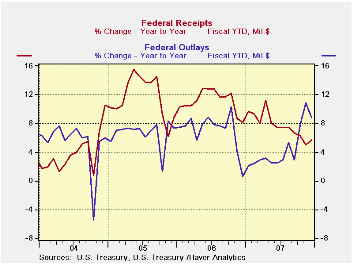 Global| Jan 14 2008
Global| Jan 14 2008U.S. Budget Deficit Deeper in 1Q FY08: Growth in Receipts Down, Outlays Up
by:Tom Moeller
|in:Economy in Brief
Summary
The U.S. government ran a budget surplus this past December of $48.261B, about the same as during December of 2006. These two figures were improved from the December deficits of the prior two years. For the first three months of FY08, [...]

The U.S. government ran a budget surplus this past December of $48.261B, about the same as during December of 2006. These two figures were improved from the December deficits of the prior two years.
For the first three months of FY08, however, the government's budget deficit deepened to $105.5B versus a deficit of $80.4B during the first three months of FY07.
Federal receipts grew 5.7% y/y, a slowdown from the 8.2% y/y growth during the first three months FY07. Growth in individual income tax receipts (44% of total receipts) continued steady at 9.1%. Withheld income taxes grew 10.5%, which was an acceleration from 8.3% growth early last fiscal year, but non-withheld taxes fell 4.0% versus 28.3% growth during the first three months of FY07.
As a result of the slowdown in corporate profit growth, growth corporate income taxes (13% of total receipts) showed a shortfall of -1.0% versus an 18.6% gain in FY07. Employment & general retirement contributions picked up to a 6.9% rate of growth from 3.7% but unemployment insurance receipts fell 6.4%, about the same as during the prior fiscal year.
U.S. net outlays grew 4.9%, reversing a y/y decline of 5.6% in early FY07. Growth in defense spending (19% of total outlays) eased to 2.1% from 3.8% and Medicare expenditures (12% of outlays) fell 33.4%, but spending in many other categories picked up: agriculture, transportation, health, income security, justice administration and interest, with the rise in interest rates. Growth in social security spending (21% of outlays) held about steady at 6.3%.The Government's financial data is available in Haver's USECON database.
Monetary Policy Flexibility, Risk Management, and Financial Disruptions is Friday's speech by GovernorFrederic S. Mishkin and it can be found here.
| US Government Finance | December | November | Y/Y | FY 2007 | FY 2006 | FY 2005 |
|---|---|---|---|---|---|---|
| Budget Balance | $48.261B | $-98.238B | $41.961B (12/06) |
-$162.8B | -$248.2B | -$318.7B |
| Net Revenues | $277.0B | $151.1B | 6.5% | 6.7% | 11.8% | 14.1% |
| Net Outlays | $228.7B | $249.3B | 4.9% | 2.8% | 7.4% | 7.6% |
Tom Moeller
AuthorMore in Author Profile »Prior to joining Haver Analytics in 2000, Mr. Moeller worked as the Economist at Chancellor Capital Management from 1985 to 1999. There, he developed comprehensive economic forecasts and interpreted economic data for equity and fixed income portfolio managers. Also at Chancellor, Mr. Moeller worked as an equity analyst and was responsible for researching and rating companies in the economically sensitive automobile and housing industries for investment in Chancellor’s equity portfolio. Prior to joining Chancellor, Mr. Moeller was an Economist at Citibank from 1979 to 1984. He also analyzed pricing behavior in the metals industry for the Council on Wage and Price Stability in Washington, D.C. In 1999, Mr. Moeller received the award for most accurate forecast from the Forecasters' Club of New York. From 1990 to 1992 he was President of the New York Association for Business Economists. Mr. Moeller earned an M.B.A. in Finance from Fordham University, where he graduated in 1987. He holds a Bachelor of Arts in Economics from George Washington University.






